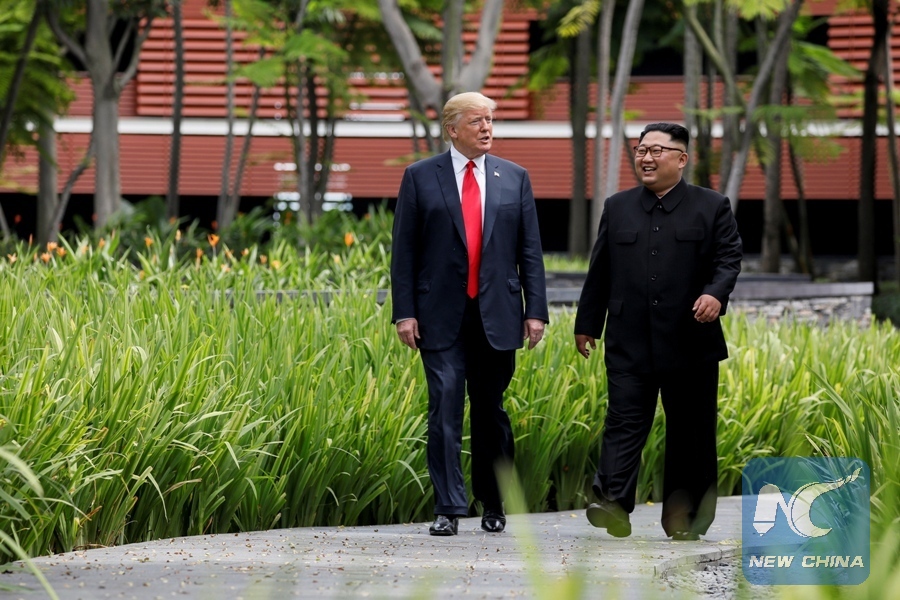
FILE PHOTO: U.S. President Donald Trump and DPRK leader Kim Jong Un walk together before their working lunch during their summit at the Capella Hotel on the resort island of Sentosa, Singapore, June 12, 2018. (REUTERS/Jonathan Ernst/File Photo)
WASHINGTON, Aug. 25 (Xinhua) -- U.S. President Donald Trump's tweets on China concerning the denuclearization of the Democratic People's Republic of Korea (DPRK) are ill-grounded and is merely "passing the buck", analysts said.
Just one day after Secretary of State Mike Pompeo announced his visit to the DPRK next week, Trump tweeted on Friday that he has asked Pompeo not to go due to the insufficient progress with respect to the denuclearization of the Korean Peninsula.
Trump also tweeted: "because of our much tougher Trading stance with China, I do not believe they are helping with the process of denuclearization as they once were."
He added that Pompeo looks forward to going to the DPRK in the near future, "most likely after our Trading relationship with China is resolved."
Benjamin Friedman, a foreign policy fellow and defense scholar at Defense Priorities, a Washington-based think tank, told Xinhua that the U.S. trade dispute with China is not the reason the DPRK hasn't fully denuclearized.
"The challenge is that by essentially claiming to have achieved that goal in Singapore, President Trump has made it difficult for his administration to accept something less. Ideally the United States would adopt a more realistic goal ... more patience in seeking results would also be useful," he added.
Troy Stangarone, senior director of congressional affairs and trade at the Washington-based non-profit Korea Economic Institute, also told Xinhua that "China's preference was always for dialogue over sanctions for dealing with North Korea and its actions likely reflects its own policy preference more than active efforts to exert a negative influence on the talks" between Washington and Pyongyang.
"If the United States and North Korea are unable to find a way through this impasse, the talks will likely end where prior efforts have," he added.
Vipin Narang, associate professor of political science at MIT, tweeted that "reason not to freak out: Trump ran this same play before Singapore, canceling and then going."
"So this is the 'call me maybe' strategy. Worked once before with the Summit. Will it work again? I'm much more skeptical this time because ... this time he (Kim Jong Un) is in a much stronger position," he said.
The expert added that by making these remarks, Trump hopes to blame China, and not himself for lacking of progress in the U.S.-DPRK negotiations.
Eric Gomez, a policy analyst for defense and foreign policy studies at the Cato Institute, said that "once again with North Korea, Trump creates a problem that didn't need to exist."
"U.S.-DPRK progress has been slow but its only been a few months since Singapore," said Gomez. "The slow progress is to be expected given the agreement that was reached but Trump's hype post summit bred frustration."
Chinese Foreign Ministry spokesperson Lu Kang said Saturday in response to Trump's remarks that China's stance on the Korean Peninsula nuclear issue is consistent and clear, and China hopes all relevant parties adhere to the direction of political settlement.
U.S. remarks went against basic facts and were irresponsible, Lu said, adding that China has, for many years, played an important and constructive role in pushing for the proper solution to the Korean Peninsula nuclear issue, and always comprehensively and strictly implemented the resolutions of the UN Security Council on the DPRK.
Analysts also speculated that Trump's decision came for fear that Pompeo's fourth trip to the DPRK would be fruitless.
Suzanne DiMaggio, director and senior fellow at New America, a think tank, said that "as Trump faces the worst week of his presidency, the last thing he wants to add to his mounting troubles is Pompeo coming home from North Korea empty-handed yet again. North Korea is supposed to be Trump's big foreign policy win."
"By over-hyping the outcomes of his meeting with Kim Jong Un in Singapore ... Trump has given Pyongyang the advantage and undercut his own negotiators. Placing the blame on Beijing is not the way to dig out of this self-created hole," she added.
Bruce Klingner, a senior research fellow for Northeast Asia at the Heritage Foundation's Asian Studies Center, said that "Trump's canceling Secretary Pompeo's trip to Pyongyang ... reflects poor coordination on the administration's North Korea policy."
"Trump again incorrectly blames China for NK," he said. "The diplomatic road ahead is much longer and bumpier than originally depicted by President Trump."
Mintaro Oba, a former State Department diplomat specializing in the Korean Peninsula, tweeted that "what's concerning to me is the implication here that the President is trying to link U.S.-China trade issues with North Korea denuke."
"That's both a misguided read on the situation, and a game we will almost certainly lose," he said.

